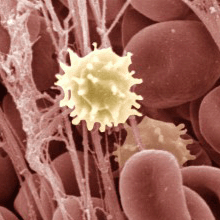
Researchers have identified a genetic variant that increases risk of follicular lymphoma (FL), a type of blood cancer.
FL is a type of Non-Hodgkin lymphoma (NHL), the fifth most common cancer in the U.S. Nearly 20,000 patients die and 66,000 more are diagnosed with NHL each year. The incidence of FL has doubled within the past 30 years.
In a study by Skibola et al., scientists analyzed the genomes of 4,805 people of European descent from the United States, Germany and Canada to search for genetic associations with four different subtypes of lymphoma. The results, published online this week in the journal Nature Genetics, newly linked one SNP to an elevated risk for developing FL in European populations.
FL is a slow-progressing cancer of the white blood cells that affects middle-aged and elderly people. It is usually diagnosed in advanced stages, but patients live approximately 10 to 12 years after diagnosis.
Skibola et al. revealed that having one copy of the C version of a SNP located on chromosome 6, is associated with 1.69 times increased odds of FL compared to people with two copies of an A at this SNP. Carrying two copies of C at this SNP is associated with 2.22 times increased odds of FL. Because a majority of the population carries the C version, another way to look at these results is to say that those who have the A version of this SNP appear to be somewhat protected from FL.*
This SNP is located near a region that is associated with susceptibility to psoriasis. The researchers said that further studies are required to evaluate whether is also associated with psoriasis due to this genetic overlap. Future research may also determine whether FL is associated with exposure to viruses such as HIV.



